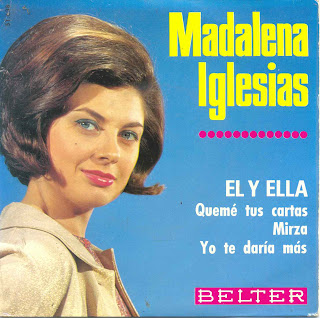 Bossavision is a collection of Eurocovers in Bossanova-lite style by Brasilian singers. It's a Greek project (hence the large number of Greek entries) coordinated by Easy Coutiel & Nektarios Tyrakis.
Bossavision is a collection of Eurocovers in Bossanova-lite style by Brasilian singers. It's a Greek project (hence the large number of Greek entries) coordinated by Easy Coutiel & Nektarios Tyrakis.It has all your favorite winners Ding-A-Dong, Waterloo, L'oiseau et l'enfant and Diva and unevitably Volare, the oldest entry in the collection. It's great to see modern Eurovision back in Brasil (they sort of lost interest after the 70's), although I haven't found any Brasilian website mentioning this collection.
Barbara Mendes for example has released several CDs in Greece including a live collection recorded in Greece in 2001.
The laid back bossa collection is a bit monotonous at times, but it's the perfect soundtrack for a romantic night on the beach or dinner party with the neighbours. The CD is released in Greece on Mercury/Universal and is available through some Greek webshops like Yupi, Greekbooks, GreekMusicShop.
Tracklist:
 1. Barbara Mendes (pic) - My Number One (Greece 2005)
1. Barbara Mendes (pic) - My Number One (Greece 2005)2. Carol (Assad) & Zeca Rodrigues - Every Way That I Can (Turkey 2003)
3. Marcela Mangabeira - Ding A Dong (Netherlands 1975)
4. Saloa Farah - Die For You (Greece 2001)
5. Eliza Lacerda - Waterloo (Sweden 1974)
6. Barbara Mendes - Secret Combination (Greece 2008)
7. Rachelle Spring - Diva (Israel 1998)
8. Marcela Mangabeira - Shake It (Greece 2004)
 9. Flavio Mendes - Save Your Kisses For Me (U.K. 1976)
9. Flavio Mendes - Save Your Kisses For Me (U.K. 1976)10. Marion - Tell Me (I Anixi, Greece 1991)
11. Daniela Procopio - Nel Blu Dipinto Di Blu (Volare) (Italy 1958)
12. Rachelle Spring - Solfege Lesson (Mathema Solfege, Greece 1977)
13. Marion - L' Oiseau Et L'Enfant (France 1977)
14. Guilherme Ge - Tornero (Romania 2006)
15. Marion - Apres Toi (Luxembourg 1972)
16. Carol (Assad) & Zeca Rodrigues (pic) - Where Are You Now (U.K. 1998)
Check out Planetworks and here is a Youtube promo
 Brasil is the non Eurovision country with the most Eurocovers to its name.
Brasil is the non Eurovision country with the most Eurocovers to its name.From the first contest in 1956 (with at least 7 versions by Brasilian artists)* to well into the 70's Eurovision songs have been covered by artists from Brasil.
About every Italian entry, most of the songs from the U.K. and many of the winners and hits from other countries.
If you use this search link you'll get all the Eurocovers posts that have (or mention) Eurovision coverversions from Brasil.
Also check out the Janelão Eurovision blog for a Brasilian look on Eurovision.
* Winner Refrain was covered in Brasil by at least three artists: Carlos Augusto, Aracy (Araci) Costa and Arthur Murat.
Italian entry Amami Se Vuoi was covered by Zézé Gonzaga, Wilma Bentivegna, Vicente Celestino and pianist Britinho. Most have been released on good old 78rpm records.











.jpg)

.jpg)



























